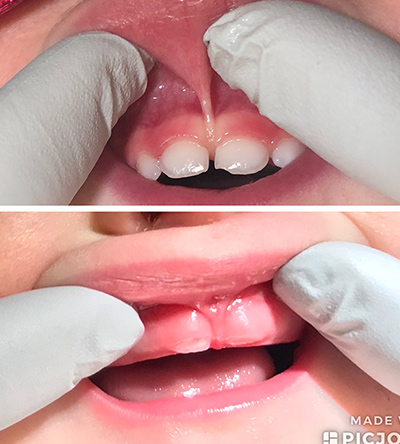
- New Moms

This "lip tie" does not need treatment
Did you know that pregnant moms with untreated cavities are twice as likely to have children with severe cavities?
Did you know that cavities are spreadable, and moms are the number one source of spreading cavity causing bacteria to their children?
Prenatal oral health is equally as important as infant oral health. A prenatal oral health consultation with a pediatric dentist is a great way to get off on the right foot in order to make sure your baby has the best chance of being cavity free for their entire life.
Prenatal Consultations
Similar to meet and greet appointments with pediatricians prior to the delivery of your new baby, prenatal oral health consultations help educate moms and families about how to properly take care of both mother and baby during pregnancy and after baby arrives. Even if you are not a first time mom, prenatal oral health visits are extremely informative and prepare even seasoned moms for some unexpected issues:

Comparison of a child at 7 months old and 16 months old.
Most lip and tongue attachments naturally improve with growth
Some infants have difficulty breastfeeding and pediatric dentists can provide additional support and possible treatment if a lactation consultant or pediatrician is concerned about a lip tie or tongue tie. Although we are not lactation consultants, a thorough breastfeeding assessment would be performed in order to diagnose a lip tie or tongue tie that requires treatment.
Establishing a pediatric dental home during pregnancy can help put your mind at ease by preparing you for these possible infant oral issues and prevent unnecessary treatment on your newborn. Considering laser lip tie surgery or tongue tie surgery? Think your baby has a posterior tongue tie? Many moms have difficulty breastfeeding…there sometimes is a learning curve, and it takes time and patience. However, the majority of breastfeeding complications are not associated with a lip tie or tongue tie , despite what social media and the internet say. Often the problem is related to position rather than an anatomical problem with the baby. (there are also several other possible reasons for difficult breastfeeding). Consistent support from your pediatrician, lactation consultant, and pediatric dentist can help mom and baby learn and grow together. If you have been told your baby needs a labial frenulectomy or posterior lingual frenulectomy (also called frenotomy or frenectomy) please ask us for a second opinion!

Misinformation about prenatal oral health
“Dental treatment during pregnancy isn’t safe” Dental treatment during pregnancy is not only safe, but absolutely necessary. X-rays during pregnancy are safe (lead aprons protect both mom and baby) and sometimes necessary in order to diagnose cavities so that they can be fixed before baby arrives. It’s recommended to fix all cavities and eliminate dental disease during the 2nd trimester so that mom doesn’t spread cavity causing bacteria to her new baby. In addition, untreated dental disease and periodontitis during pregnancy are associated with preterm birth and preeclampsia.
“Fluoride isn’t safe during pregnancy” Fluoride is safe and absolutely recommended on a daily basis, including during pregnancy. Fluoride toothpaste helps keep mom’s teeth cavity-free, and systemic fluoride (fluoridated water, *foods naturally high in fluoride) helps the baby’s developing teeth. *leafy greens, fruits/vegetables grown in the ground, fish
“Pregnancy rots your teeth and gums” or “Pregnancy strips the fluoride and calcium from the mom and gives it to baby” Many mothers increase their susceptibility to cavities and gum disease due to frequent vomiting in the first trimester, frequent snacking on carbohydrates due to cravings, and infrequent brushing due to increased gag reflex or aversion to certain flavors in toothpaste. Although hormones in pregnancy can increase your sensitivity to plaque, your gums should not bleed and your teeth should not rot if you maintain adequate oral hygiene and a healthy diet while pregnant.
What to expect at a prenatal oral health consultation:
Even if you aren’t a “new” mom, please contact us to schedule a prenatal oral health consultation so that mom and baby have the best chance for a healthy pregnancy, successful delivery, and optimal oral health.